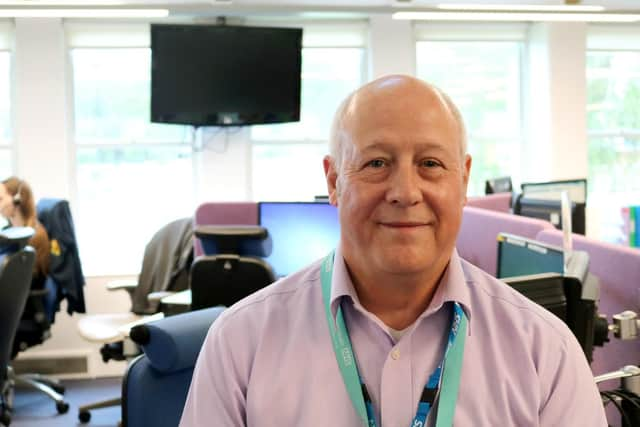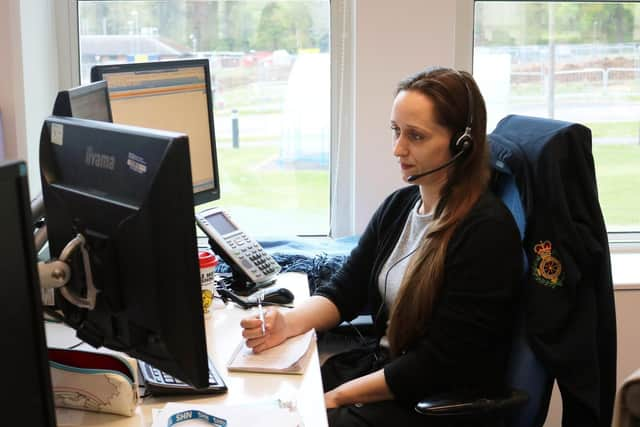Health in Mind: How new mental health nurses at 111 are leading a ‘pioneering’ system


Part of that is attributed to the stigma surrounding mental illnesses but it is also recognised that some are unaware about where is best to get support.
Now, a ‘pioneering’ service that comes as part of the NHS 111 system in Hampshire is looking to change that.
Advertisement
Hide AdAdvertisement
Hide AdSince December last year the 999 and 111 call centre has piloted a mental health triage service, run by the Southern Health NHS Foundation Trust, Solent NHS Trust and the South Central Ambulance Service, which transfers people suffering from a mental health issue to one of six mental health nurses. Already the team say they are dealing with an average of 600 calls a month.


Previously a 111 caller with a mental health issue would have been put through to 999 and, unless it was a life-threatening situation, then told to go to their GP or A&E.
Sonya Mclean, mental health commissioning manager, explained why the new system was needed. She said: ‘Some of these calls are very difficult to deal with as the caller might have quite complex needs.
‘Before, those involved would be directed to the emergency calls. And that may or may not be appropriate.
Advertisement
Hide AdAdvertisement
Hide Ad‘It’s about patients wanting a simple solution and someone who has got time to talk to them.’


Typically a 111 call lasts six minutes but those that speak to the mental health team are given an average of half an hour.
Sonya added: ‘We hope this will encourage more people to make that call, knowing that they have a professional they can talk to for half an hour.’
Each mental health nurse on the 111 has a different specialism from previous experience.
Advertisement
Hide AdAdvertisement
Hide AdJohn Smith, the mental health team leader, said: ‘When it came to recruiting the team we were looking at different skill set and making sure that staff had a broad understanding of needs.
‘What we’ve ended up with is a wealth of experience. For example we have someone who has worked with older people, someone who worked in high security setting and someone with prison experience. It’s amazing how it came together.’
But sometimes the caller requires more than just a 30 minute talk with one of the nurses. The team are also able to fast-track GP appointments when appropriate, as well as send paramedics or police to attend them.
John added: ‘I describe it as frontline but on the phone.
‘There was one situation where we had a young woman who rang up in a crisis. She needed support as she was suffering from postnatal depression or potentially psychosis. We worked together with 999 and were able got in touch with other services to go out to her and make sure she didn’t harm herself.
Advertisement
Hide AdAdvertisement
Hide Ad‘But it’s a whole range of situations. You might get someone who has a bereavement and is beside themselves.’
It is also hoped that the service takes pressure away from GPs, emergency departments and 999.
Sonya said: ‘We are seeing on average around 600 calls a month. Two thirds are closed down with home management and self help and don’t need to go anywhere else, although some still going to the emergency department but it is a fraction of what it would have been before.
‘And it’s so much better for the callers. They get a much more personal service where someone has the time to listen. And if they call again we will have some of their information already so they get a level of continuity, which will make them feel happier about talking through their problems.’
Advertisement
Hide AdAdvertisement
Hide AdShe added: ‘There have been similar trials in London and Yorkshire but I think what we offer here is so much more.’
The scheme first operated in December between 6pm and 2am but since February it has been a 24/7 service. Although the pilot comes to an end in December there is scope for it to be renewed.
‘We take into account everything about a person’
Mental health nurse, Hannah Lake, explained how unique her new job on the 11 team is.
The former community nurse has worked at 111 since January.
She said: ‘It’s great how we have the time to establish an understanding of the caller.
Advertisement
Hide AdAdvertisement
Hide Ad‘We are not just dealing with their medical history. We are looking at social needs, safety needs, spiritual needs and their emotional needs.
‘You find out a lot about that person. You hear about their history and what’s happened to them in the past. Listening to their stories informs us of the best way forward.’
Hannah believed that everyone was at risk of mental health issues. ‘It’s just life, we are all susceptible to mental health problems,’ she said.
‘We don’t realise until it happens to us. If we’re not doing well in our jobs or home lives it can all seem to go wrong.
Advertisement
Hide AdAdvertisement
Hide Ad‘I definitely feel sometimes like I am making a difference. Someone you speak to someone who starts off so distressed and then you hear the relief in their voice. They know they are getting the right help.
‘We are all human. Sometimes need a bit of support and formal support.’
Referral routes via the 111 mental health nurses
Each call will receive enhanced clinical triage and undergo a risk assessment over the phone and dependant on whether they are already known to services and what their need is at the time they will be provided with appropriate intervention, support or advice or referred into:
- their GP for a next day appointment or directly booked into an appointment
- psychological therapies services
Advertisement
Hide AdAdvertisement
Hide Ad- alternative crisis services in the community such as the crisis lounge, crisis cafe or wellbeing centres
- signposted to other voluntary mental health helplines e.g. SANE, Samaritans
- an alternative and appropriate community service such as debt advice, housing need, drug and alcohol services
- Community Mental Health teams (CMHT) or Child Adolescent Mental Health Service (CAMHS)
- Crisis Resolution and Home Treatment Team (CRHTT)